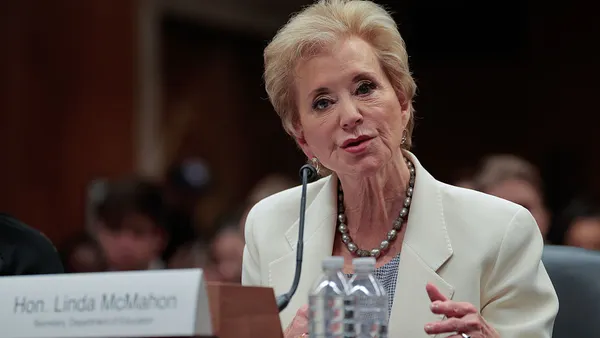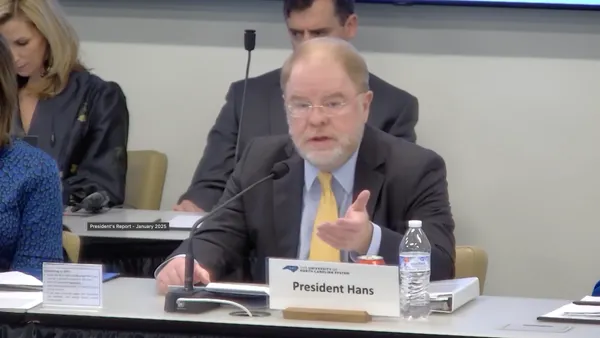Dive Brief:
- Sen. Bill Cassidy, the top Republican on the Senate’s education committee, is urging the U.S. Department of Education to explain how it will adapt in light of the Chevron doctrine being overturned by the U.S. Supreme Court.
- The Chevron doctrine required federal courts to defer to government agencies when interpreting statutes with ambiguous meanings. However, the high court struck down the 40-year precedent Friday, sharply curtailing the regulatory power of the Education Department and other federal agencies.
- In a Sunday letter, published by Politico, Cassidy accused the Education Department of “flagrantly and repeatedly" violating the law by crafting policy without authorization from Congress.
Dive Insight:
Friday’s Supreme Court ruling could deal a major blow to the Education Department’s policy agenda. Earlier this year, the Center for American Progress, a liberal think tank, predicted that overturning the Chevron doctrine would put several higher education regulations at risk, including rules meant to provide debt relief to students who have been defrauded by their colleges.
Cassidy’s letter gave the Education Department until July 19 to answer several questions about how the agency will abide by the Supreme Court’s ruling. That includes whether the agency will systematically review its activities to ensure they comply with the decision and whether it will halt any pending regulations.
An Education Department spokesperson said the agency has received the letter and is reviewing it.
Cassidy’s letter takes aim at other key regulations, including the Biden administration’s new rule for Title IX, the sweeping civil rights law prohibiting sex-based discrimination in federally funded colleges and K-12 schools.
The Education Department’s final regulations, which take effect in August, expand the definition of sex-based discrimination to include harassment based on gender identity. Over 20 conservative states have filed lawsuits against the rule, and federal judges have blocked it from taking effect in 10.
In his letter, Cassidy cited the gender identity protections under the new Title IX rule as an example of the Education Department overstepping its authority. But he stressed that the department’s "attempts at transferring student loan debt to taxpayers are particularly brazen.”
Cassidy called out several of the agency’s related policy proposals.
For instance, the Education Department recently released draft regulations that would provide debt relief to certain groups of borrowers, including those who entered repayment over two decades ago and those who owe more than they initially borrowed due to ballooning interest.
In January, the Center for American Progress flagged this effort as at risk if the Chevron doctrine were overturned.
The Education Department’s new income-driven repayment plan — called Saving on a Valuable Education, or SAVE — could also face greater legal challenges than it already is.
Under the plan, borrowers who meet a certain income threshold pay between 5% and 10% of their discretionary income toward their federal student loans. Those who initially took out $12,000 or less will have their debts cleared when they have made a decade worth of payments.
However, a federal judge last week temporarily blocked the Education Department from issuing debt relief under the plan as a legal challenge against it unfolds.
In a recent analysis for Forbes, attorney Adam Minsky argued that Friday’s Supreme Court ruling could make it harder for the Education Department to defend the legality of the SAVE plan. The program relies on a 1993 statutory provision in the Higher Education Act.
Indeed, the states suing over the plan have argued that this provision contains ambiguous language regarding the parameters of income-driven repayment plans.
“No longer required to defer to agency expertise, federal courts will have a freer hand in applying their own interpretations (and biases) to statutory terminology they deem to be ambiguous,” Minsky wrote.












